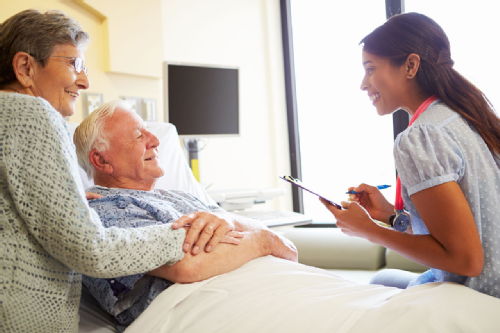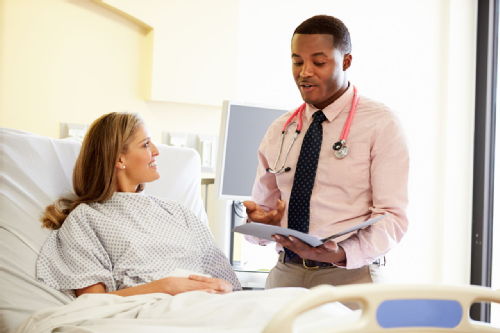All 4 entries tagged Hospital
View all 16 entries tagged Hospital on Warwick Blogs | View entries tagged Hospital at Technorati | There are no images tagged Hospital on this blog
October 29, 2015
Out into the Wild…
In my last blog I spoke about learning to love my time in hospital and I think I can safely say that I’ve cracked it! All the Phase 2 students have just completed a week full time on placement in hospital. It’s very different being in hospital full time and learning away from the lecture theatres so this past week was designed to give us a taster and identify and problems or areas we need to develop before we hit the wards full time in January.
We were assigned to wards along with our clinical partner, another person on our placement who we have chosen to work together for all our future clinical placements. We will be working closely with our clinical partners so it’s important to choose wisely!
My clinical partner and I were assigned to the Frailty Ward at Warwick hospital. This is a ward specifically designed for elderly people who require only a short stay in hospital of less than 3 days. They are a multidisciplinary team (key Medical School buzz word!) consisting of Doctors, Nurses, Occupational Therapists, Physiotherapists and social workers designed to get older patients back to their pre-hospital functioning as quickly as possible in order to prevent a permanent loss of function, which often happens after a lengthy stay in hospital.
We attended the daily ward rounds with the Consultant and Junior Doctors, taking notes for them, reading Observation charts and noting if a patient had an interesting clinical sign. You can read about what a sign should look like, see a picture or watch a video but you remember so much more when you see or hear it yourself! Seeing a raised jugulo-venous pressure around a patients’ earlobes made much more sense than reading about a flicker on the neck and seeing the characteristic tophi of gout is something I won’t forget.
As well as observing how the wards are generally run for the first time this week I actually felt useful for the first time. Having completed my T-DOC in venepuncture, I was able to take bloods this week and send them off to the lab for analysis. I was also very lucky to get the opportunity to clerk patients in A&E. I was the person to take the history and the first person to examine them which was all very exciting until I was told to present my findings to the Consultant who happened to be in charge of acute medicine at Warwick!
Getting used to learning in the clinical environment means asking a lot of questions but also answering lots. When helping clerk patients you will be asked to summarize your findings and come up with several differential diagnoses and asked what you would do next to investigate. You are put on the spot but this learning experience is really invaluable. This is how I will have to think as a Doctor so the more practice now the better!
You can also feel a bit lost in hospital and often busy wards and doctors don’t have time to teach. You have to seek out different opportunities, introduce yourself to people in the canteen, bleep services who you want to go and shadow and generally get in the way. Being so proactive is a skill in itself so this last week was a good chance to practice and I can honestly say I feel excited and ready for January now!
Joanne
October 16, 2015
Learning to Love Hospital…
A month into advanced cases and everything is much more clinical. We spend more time in hospitals and our lectures are more clinically focused. Last year I couldn’t wait until things were more clinical but now it is actually happening I’m actually very nervous! More clinical means more complexity, more unpredictability and more patients! It sounds crazy to be so nervous as this is the reason I came to medical school but trying to pull together all the information from phase 1 and apply it to real cases is a skill that I have yet to master.
Apart from an often overwhelming sense of bewilderment I’m really enjoying my time spent in hospital, I currently spend one day a week at Warwick Hospital. We had the opportunity to select some clinical learning opportunities that particularly interested us, these are half days spent with different healthcare teams around the hospital learning about their different roles.
So far I have had the opportunity to work in ambulatory care, where patients are referred to hospital direct from general practice and the clinical audit team. In the ambulatory care unit the patients presenting complaints were very diverse and there was very high turnover of patients which required expert organisation skills and quick review of investigations from the FY1 I was shadowing.
Working in this acute clinical environment was very different from my time shadowing the clinical audit team. Over a much appreciated cup of tea the team took me through the audit process including the large national audits that the hospital takes part in. I also saw how the outcomes of audits are implemented, from large changes to national guidelines to small changes in local services; these all directly improve patient care.
Other clinical learning opportunities I have over the next few weeks include the radiology department, outpatient’s clinic and theatres. Getting a feel for all these different areas will help prepare us for full time life on the wards in Core Clinical Education, which starts in January.
As well as shadowing lots of different teams within the hospital we are also starting to complete some more practical skills training including how to conduct patient observations correctly and learning how to use the early earning score systems used on the wards and how to take bloods. We also learn about basic airway management and more advanced hospital resuscitation, which includes how to use a defibrillator. I don’t think we’ll be in charge of any cardiac arrests anytime soon but it does feel good to learn some more practical skills in phase 2. I’ve decided to think of my time in hospital as a reward for surviving phase 1 and a welcome change from the lecture theatre!
Joanne
February 10, 2014
The strange things that may go through your mind when you first visit a ward

“Hello, my name is Amritpal Sandhu, and I am a first year medical student”. Before starting Medical School I would have given anything to be able to legitimately use this phrase, but when it first became a reality I felt completely different. I’m not nervous about talking to patients; in fact I look forward to it. Before coming to medical school I had spoken to lots of patients, and even more nerve racking, lots of relatives, and it was always the best part of my day. So why did it all feel different on my first day on the wards?
At Warwick you are put on the wards for half an afternoon every week from the second term. Your experience will vary based on your group (groups of four), your consultant and, of course, the patients you get to see.
My first time on the ward as a medical student was very different to any other experience I have had on a ward. All of a sudden I found myself hyperaware of everything I did and said. For starters there is the stethoscope and what to do with it, something that still causes me quite a stir! Do I put it round my neck and feel like a pretender the whole time and pray no one mistakes me for an actual doctor? Or do I keep this piece of medical equipment out of sight, in my trouser pocket next to my phone, keys and (unused) chewing gum only to go through the ultimate struggle every time I try to extract it? I seriously envy my female colleagues who are savvy enough to carry around a small bag they can use to house this attention grabbing piece of kit, so much so I have even considered trying to bring the bum-bag back into fashion!
Then there was the decision on how to introduce myself to a patient resulting in an internal monologue that that sounded a bit like this: “Do I shake their hand? Do I use their first name or last name? Do I smile? Well, of course I do….don’t I? Wait, they’re ill, you don’t want to seem happy they’re ill! Fine, I’ll smile, but I won’t show too many teeth”. You would think I’ve never worked with patients before!
Finally, once I had gotten over myself and these quite frankly bizarre and distracting thoughts, it was time to sit down next to ‘my’ patient and take a history. For those who don’t know, a history is an interview with a patient where they tell you what has led to them being in hospital. You also need to find out about any other health problems they might have and a whole long list of other important information you need to gather. If you do it right it feels like a conversation between two people, you get it wrong you can feel like you are interrogating someone. It is a juggling act. You want to:
- Make the patient feel comfortable
- Ask all the right questions
- Get all the relevant information
- Make the conversation flow
- Think of questions that will help you eliminate the nastier things
- Try and diagnose the patient whilst you are talking to them
- And, most importantly, listen to what the patient is saying!
Halfway through the first history I took I realised I was too focused on trying to remember what was wrong with the patient that I completely forget their name! Luck was on my side however and it was written in big capital letters above their bed, let this be a lesson, being observant (or lucky, as I was) pays!

All jokes aside, the first time you are on a ward it is pretty surreal, and upon reflection a lot of the pressure I felt was created purely by me. Perhaps it is because it is drilled into us from day one that we are representing the medical profession, a profession that we are still working very hard to become a part of. Or maybe it is because no matter how many times you practice taking a history with your mates nothing can quite replicate what it is actually like with a real patient. It takes a while to realise that patients don’t expect you to know everything and are happy to explain things you don’t understand and are very forgiving when you do forget things. It takes even longer to realise that no one really notices the silly things you will obsess over and you’re not constantly in the way, even though you may feel as though you are.
Although it may sound as though it is pretty scary, as soon as you find your feet it is great fun being on the wards and talking to patients. It is a real privilege to be in the position you find yourself in as a medical student and I cannot wait to enter the clinical phase. I hope to spend a lot more of my time on the wards with patients and a lot less of my time with PowerPoint presentations and flash cards!
January 22, 2014
Teddy Bear Hospital
Our year has just entered Phase II. This is an exciting part of the course which we have all looked forward to and was very much the light at the end of the tunnel during the very intense period leading up to the end of Phase I exams. We’re now starting the clinical part of the course where the majority of teaching is done on wards and clinics.
We have just had our induction week where we are taught about the NHS in a bit more detail and advised on how to make the most of our experience in Phase II, where the learning is a lot less structured and much more student led.
We are now in the first ‘block’ of Phase II which is currently Learning from Lives; during this attachment we will meet, talk to and in some cases provide care for patients who live with life limiting diseases and disability. This block is unique in the way that it is structured.
During this six week block the cohort is split into two and we alternate between three weeks of teaching and three weeks off. I have the first three weeks off so I thought I would take this opportunity to discuss in a bit more detail some of the societies I have had the privilege to be a part of during my time here at Warwick Medical School.

First of all, the Teddy Bear Hospital society. This is a fantastic initiative where we get to help dispel some of the mystery and fear that children often associate with visiting the doctor and it also gives us as medical students the unique opportunity to interact with children and work on our communication skills. This is quite important, as although children can often be anxious about interacting with a doctor, we too, as medical students, can be quite apprehensive about interacting with children.
The Teddy Bear Hospital is a public health project aimed at three to seven year olds designed to help reduce the anxiety associated with visiting the doctor or hospital. The sessions are held at primary schools and are organised and run by Warwick Medical School students.
The children bring along their ‘sick’ teddy bear and act as parent during their visit to the Teddy Bear Doctor in the clinic. They will go through a mock A&E and explain what is wrong with their Teddy and how they became ill, which can quite often be imaginative, tragic or simply outlandish! We then take an X-ray of the teddy and explain what is wrong with them and offer them the opportunity to apply a plaster cast to their ‘pawly’ teddy.
The other stations run on the day include healthy eating, what to do in an emergency, the human body and an exercise station. For a lucky few medical students there is the opportunity to wear a teddy bear costume and welcome the children as they come into the building!
If you ever get the opportunity to volunteer with this unique society I would whole-heartedly recommend it. I have thoroughly enjoyed my experience volunteering, so much so I have now become a member of the committee. You will be in awe of some of the cuddly toys (one young man bought in a human size dragon!) and enchanted by the imagination of the children. It is a truly worthwhile experience for all involved.
 Megan Earle
Megan Earle

 Please wait - comments are loading
Please wait - comments are loading
 Loading…
Loading…